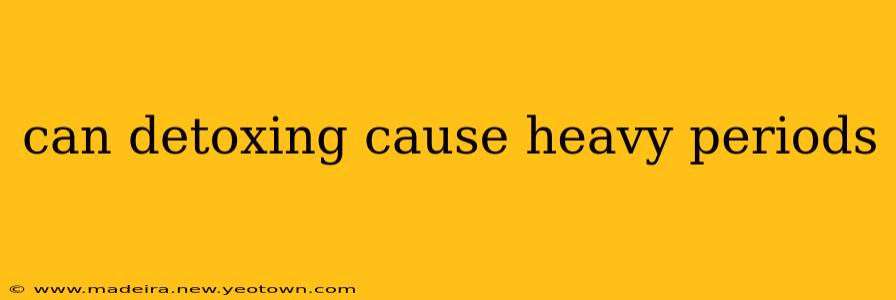The idea of a "detox" is alluring. We're bombarded with promises of shedding toxins and feeling rejuvenated. But what about the potential consequences? Many women wonder: can detoxing actually lead to heavier periods? The short answer is complex and, often, no. But let's explore the nuances of this connection and address some common misconceptions.
My name is Dr. Eleanor Vance, and I've spent years researching women's health. While the term "detox" lacks a precise medical definition, I'll address the practices often associated with it – cleanses, restrictive diets, and supplement use – and their potential impact on menstrual cycles.
What is a "Detox"? Is it medically sound?
Before we discuss the effects on menstruation, let's clarify what "detoxing" typically entails. Many so-called detox programs involve restrictive diets (often eliminating entire food groups), juice cleanses, or taking numerous supplements marketed for detoxification. From a medical perspective, these practices aren't usually necessary. Our bodies have sophisticated natural detoxification systems – our liver and kidneys – that do an excellent job of filtering out waste products.
The claims made by some detox programs are often exaggerated and lack scientific backing. Instead of relying on these potentially harmful shortcuts, it's far healthier to focus on a balanced diet, regular exercise, and sufficient hydration.
Can Certain Detox Diets Impact Menstrual Flow?
While a true "detox" isn't medically necessary, restricting calories or eliminating essential nutrients can disrupt hormonal balance, potentially leading to changes in menstrual flow. This is because hormones regulate the menstrual cycle, and nutritional deficiencies can throw this delicate system off. For example:
- Iron Deficiency: A diet severely lacking in iron can cause anemia, a condition that frequently results in heavier bleeding. This isn't directly caused by a "detox" itself, but by the restrictive nature of many detox diets.
- Nutrient Deficiencies: Eliminating entire food groups, as many detox plans suggest, can deprive the body of essential vitamins and minerals crucial for hormone production and menstrual regulation.
- Stress: Restrictive diets can be incredibly stressful on the body, and chronic stress is known to disrupt hormonal balance and contribute to irregular or heavier periods.
Can Supplements Used in Detox Programs Affect Menstrual Cycles?
Many detox programs involve taking various supplements, some of which may interact with medications or have side effects that impact menstruation. For instance:
- Herbal Supplements: Some herbs used in detox programs can affect hormone levels and potentially lead to changes in menstrual flow. Always consult your doctor before using herbal supplements, as they can interact with medications or have unknown long-term effects.
How Does Detoxing Impact Hormones Related to Menstruation?
The hormonal interplay during menstruation is intricate. Any disruption, whether caused by nutritional deficiencies or stress related to a detox, can lead to irregularities. Estrogen and progesterone are key players, and any imbalance can manifest as heavier periods, shorter cycles, or even amenorrhea (absence of periods). It's crucial to remember that the body's hormonal balance is sensitive and requires a balanced approach.
What are the signs of a healthy menstrual cycle?
Regular, consistent cycles (approximately 21-35 days) with moderate bleeding (lasting 3-7 days) are generally considered healthy. However, individual variation is substantial, and what's "normal" can differ.
When should I consult a doctor about my menstrual cycle?
If you experience significant changes in your menstrual flow – such as unusually heavy bleeding, prolonged bleeding, or significant changes in cycle length – it's crucial to seek medical advice. Your doctor can help determine the underlying cause and recommend appropriate treatment.
In conclusion, while the notion of a "detox" impacting menstrual flow isn't directly causal, the restrictive practices associated with many detox programs can disrupt hormonal balance, leading to heavier periods. Prioritize a balanced diet, regular exercise, and stress management over potentially harmful detox practices. If you have concerns about your menstrual cycle, always consult your healthcare provider for personalized guidance.

